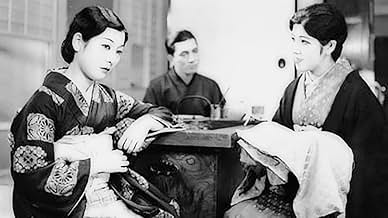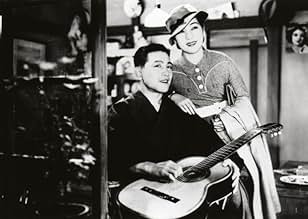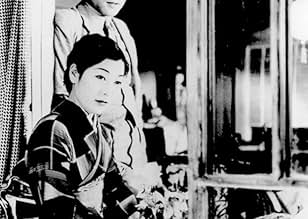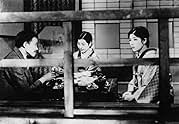IMDb-BEWERTUNG
7,5/10
609
IHRE BEWERTUNG
Füge eine Handlung in deiner Sprache hinzuWhen she reaches adulthood, a precocious young woman sets out to find her biological father, who, as her mother tells her, abandoned them for another woman.When she reaches adulthood, a precocious young woman sets out to find her biological father, who, as her mother tells her, abandoned them for another woman.When she reaches adulthood, a precocious young woman sets out to find her biological father, who, as her mother tells her, abandoned them for another woman.
- Regie
- Drehbuch
- Hauptbesetzung
- Auszeichnungen
- 1 wins total
Empfohlene Bewertungen
10Red-125
The Japanese film "Tsuma yo bara no yô ni" was shown in the United States with the title, "Wife! Be Like a Rose!" or "Kimoko" (1935). It was directed by Mikio Naruse.
This film was the first major film directed by Naruse, but it's clear that he had already mastered the art of cinema. Naruse's films are typically melodramas about middle-class or working-class people. His movies, like this one, are often tinged with sadness.
Sachiko Chiba plays Kimiko Yamamoto, a young office worker who has a modern outlook and dresses in western fashion. She lives with her mother, who is a talented poet. However, her mother is depressed, and most of the poems she writes are about her husband, who has left the family and moved to the countryside.
Kimiko travels to her father's village, in order to convince him to return home to his wife and to her. When she meets with her father, she learns that matters are not at all what they had seemed.
I wish I could write more about this very interesting plot, but the enjoyment of this film depends upon the unexpected events that occur during and after Kimiko's trip. I have no intention of spoiling the movie for those reading this review.
We saw this film at the Dryden Theatre, in an original 35mm print that is owned by The George Eastman Museum. It's hard to believe that this movie is apparently unavailable in the U.S. on DVD. In fact, I hesitated to review it, because what's the point of a review if no one can see the film? However, the movie was excellent, and possibly it will play in a Naruse retrospective in your location. If so, don't miss it!
Note: In 1937, two years after the film was made, Naruse married the star of the film--Sachiko Chiba. Sadly, life followed art, and they were divorced three years later.
This film was the first major film directed by Naruse, but it's clear that he had already mastered the art of cinema. Naruse's films are typically melodramas about middle-class or working-class people. His movies, like this one, are often tinged with sadness.
Sachiko Chiba plays Kimiko Yamamoto, a young office worker who has a modern outlook and dresses in western fashion. She lives with her mother, who is a talented poet. However, her mother is depressed, and most of the poems she writes are about her husband, who has left the family and moved to the countryside.
Kimiko travels to her father's village, in order to convince him to return home to his wife and to her. When she meets with her father, she learns that matters are not at all what they had seemed.
I wish I could write more about this very interesting plot, but the enjoyment of this film depends upon the unexpected events that occur during and after Kimiko's trip. I have no intention of spoiling the movie for those reading this review.
We saw this film at the Dryden Theatre, in an original 35mm print that is owned by The George Eastman Museum. It's hard to believe that this movie is apparently unavailable in the U.S. on DVD. In fact, I hesitated to review it, because what's the point of a review if no one can see the film? However, the movie was excellent, and possibly it will play in a Naruse retrospective in your location. If so, don't miss it!
Note: In 1937, two years after the film was made, Naruse married the star of the film--Sachiko Chiba. Sadly, life followed art, and they were divorced three years later.
I have no use for melodrama dished out straight. This is because my stance is that even the most ordinary life on the planet is experienced as a deep personal drama, so dramatizing on top of that produces a ludicrous, myopic effect. As though a particular dramatic chain of events is somehow more revealing, more insightful about what it means to live, so needs to be magnified for us to notice.
What I'm looking for instead in a film like this is how deeply it is prepared to acknowledge the fabrication of its drama and contrivance. How far it can imagine the controls to go in any given situation and does it offer a glimpse of bare soul beyond them.
Unlike previous films by Naruse, this one is a welcome sight. The main idea is that we are set up to imagine the story to be a certain way, a father has abandoned wife and daughters to shack up with a geisha, so we assume he's a scoundrel, the mistress a scheming succubus, but when we finally travel to meet him, the situation turns out to be completely different. The story as we heard it from the mother, and is generally believed to be true in that circle, was a myopic (melodramatic) fabrication. The father turns out to be a very decent and caring family man.
So far this would make for powerful irony exposing unpredictable life beneath the organized tapestry of fictions, deceitful in their haste to imagine drama. The woman is not a geisha, which would have been the assigned melodramatic role, but a hard-working hair dresser striving to raise a family.
Since both these people are not who we believed were going to be, and since the sole reason the father was sought after in the first place was to fulfill his part in social circumstances, this begs the question. How much of anyone else we meet and believe to know in context of those circumstances, is really that person?
But there is another point that really elevates this in my eyes. There is no clue that the mother has calculated to deceive, which would have been another ordinary trope of melodrama. She's just a lonely, hopelessly romantic creature. She spends her time writing poetry, funneling life she does not live into idle ruminations about living it. The intention I believe is to counterpoint this against the father's main activity: prospecting for gold in the hills, perhaps equally futile time spent but hard work spending it.
Melodrama about the dissolution of the same is what we have, marvelously so. What Naruse doesn't seem to notice, is that he replaces this with another melodrama in this second family that is the reverse of the first. Cessation is only half-accomplished but for the time this is enough.
What I'm looking for instead in a film like this is how deeply it is prepared to acknowledge the fabrication of its drama and contrivance. How far it can imagine the controls to go in any given situation and does it offer a glimpse of bare soul beyond them.
Unlike previous films by Naruse, this one is a welcome sight. The main idea is that we are set up to imagine the story to be a certain way, a father has abandoned wife and daughters to shack up with a geisha, so we assume he's a scoundrel, the mistress a scheming succubus, but when we finally travel to meet him, the situation turns out to be completely different. The story as we heard it from the mother, and is generally believed to be true in that circle, was a myopic (melodramatic) fabrication. The father turns out to be a very decent and caring family man.
So far this would make for powerful irony exposing unpredictable life beneath the organized tapestry of fictions, deceitful in their haste to imagine drama. The woman is not a geisha, which would have been the assigned melodramatic role, but a hard-working hair dresser striving to raise a family.
Since both these people are not who we believed were going to be, and since the sole reason the father was sought after in the first place was to fulfill his part in social circumstances, this begs the question. How much of anyone else we meet and believe to know in context of those circumstances, is really that person?
But there is another point that really elevates this in my eyes. There is no clue that the mother has calculated to deceive, which would have been another ordinary trope of melodrama. She's just a lonely, hopelessly romantic creature. She spends her time writing poetry, funneling life she does not live into idle ruminations about living it. The intention I believe is to counterpoint this against the father's main activity: prospecting for gold in the hills, perhaps equally futile time spent but hard work spending it.
Melodrama about the dissolution of the same is what we have, marvelously so. What Naruse doesn't seem to notice, is that he replaces this with another melodrama in this second family that is the reverse of the first. Cessation is only half-accomplished but for the time this is enough.
A very dear film by the young Naruse Mikio, and the theme is what it so often is in the great Japanese cinema of the 1930s, 40s and 50s: the heart wants what it wants. The lovely daughter is played by Chiba Sachiko, and she would later marry Naruse. The wonderful Japanese actor Maruyama Sadao plays the father. Maruyama would later be exterminated in the U.S. terror bombing of Hiroshima.
This is a tender love story taking place about the time when the Japanese war machine was raping Nanking (Nanjing), enslaving Korean women, attacking the Philippines, and preparing to bomb Australia and America. These contrasts are startling as is the contrast that is in the lesson of the film. Naruse-san teaches us once again that the truth about a person resides not in the words and inferences spoken, rather in direct observation and understanding. Here we have a young women approaching the age of independence being raised by her mother who continually painted the absent father as an unfaithful woman chaser living with a woman of ill repute. The daughter wants to actually meet her father and she wonders why he left her and her mother. She trains to the remote village where the father lives with the infamous lady.
The actual meeting, first when the father and daughter view each other from a distance is the perfect technique Naruse-san used in other films, to the actual polite, respectful way the Japanese greet each other, is quite emotional and the viewer senses the love each has for the other, bridging the years of separation.
The daughter is quite surprised to learn that the so-called infamous woman is simply a very plain and loving farm lady with no special beauty nor male allure. She quite simply loves the man she lives with; she is a marvelous rose, something the man's wife was not.
As far as I know, the film is not available on DVD. I wish it were.
The actual meeting, first when the father and daughter view each other from a distance is the perfect technique Naruse-san used in other films, to the actual polite, respectful way the Japanese greet each other, is quite emotional and the viewer senses the love each has for the other, bridging the years of separation.
The daughter is quite surprised to learn that the so-called infamous woman is simply a very plain and loving farm lady with no special beauty nor male allure. She quite simply loves the man she lives with; she is a marvelous rose, something the man's wife was not.
As far as I know, the film is not available on DVD. I wish it were.
A young middle-class woman sets out to a remote mountain village in Nagano to bring her estranged father back to Tokyo where his presence is needed to fulfill some pressing social obligations - chief among them a meeting between her parents and the father of her intended bridegroom. Her own father, though, would rather stay with his common law wife - a former geisha - and their two children despite their relative poverty and "disgraceful" circumstances. Father is happy prospecting for non-existent gold in the rivers of his adopted rural home, while his selfless and devoted 'wife' ekes out a living as a hairdresser.
Back in Tokyo, Etsuko, the abandoned wife and Kimiko's self-absorbed and pretentious mother publishes mournful haiku for her long lost husband and patiently waits for his return. Will Father return to his "rightful" place with his "legitimate" family or will he forsake them for his mistress and their two children? Naruse Mikio's comic and heart stirring melodrama 'Wife! Be Like a Rose' offers a surprising and refreshing take on familiar Japanese themes on 'self-sacrifice' and filial devotion.
Back in Tokyo, Etsuko, the abandoned wife and Kimiko's self-absorbed and pretentious mother publishes mournful haiku for her long lost husband and patiently waits for his return. Will Father return to his "rightful" place with his "legitimate" family or will he forsake them for his mistress and their two children? Naruse Mikio's comic and heart stirring melodrama 'Wife! Be Like a Rose' offers a surprising and refreshing take on familiar Japanese themes on 'self-sacrifice' and filial devotion.
Wusstest du schon
- WissenswertesThis was possibly the first fictional feature film from Japan to be distributed in the United States, under the name "Kimiko."
- VerbindungenRemade as Koi ni mezameru koro (1969)
Top-Auswahl
Melde dich zum Bewerten an und greife auf die Watchlist für personalisierte Empfehlungen zu.
Details
- Erscheinungsdatum
- Herkunftsland
- Sprache
- Auch bekannt als
- Wife! Be Like a Rose!
- Produktionsfirma
- Weitere beteiligte Unternehmen bei IMDbPro anzeigen
- Laufzeit
- 1 Std. 14 Min.(74 min)
- Farbe
- Sound-Mix
- Seitenverhältnis
- 1.37 : 1
Zu dieser Seite beitragen
Bearbeitung vorschlagen oder fehlenden Inhalt hinzufügen




















